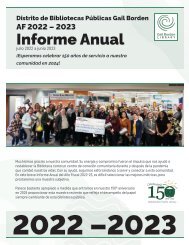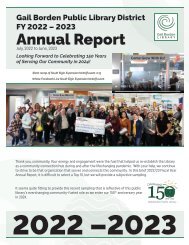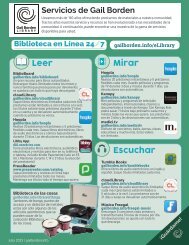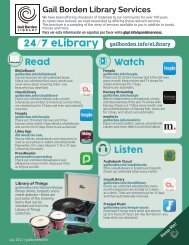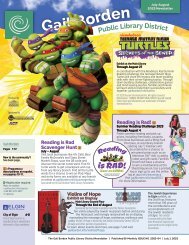May June Newsletter 2021
- No tags were found...
You also want an ePaper? Increase the reach of your titles
YUMPU automatically turns print PDFs into web optimized ePapers that Google loves.
<strong>May</strong>-<strong>June</strong><br />
City of Elgin<br />
<strong>2021</strong> <strong>Newsletter</strong><br />
Be Part of the Solution to Storm Water Pollution<br />
As stormwater flows over driveways, lawns and sidewalks, it picks up<br />
debris, chemicals, dirt and other pollutants. Stormwater can flow into a<br />
storm sewer system or directly to a lake, stream, river or wetland.<br />
By practicing healthy household habits, homeowners can keep common<br />
pollutants like pesticides, pet waste, grass clippings and automotive fluids<br />
off the ground and out of stormwater.<br />
Healthy Household Habits<br />
Use pesticides and fertilizers<br />
sparingly and avoid application just<br />
before rainfall.<br />
Grow native plants and grasses that<br />
require less water, fertilizer and<br />
pesticides.<br />
Sweep yard debris, rather than<br />
hosing areas down and compost or<br />
recycle yard waste when possible.<br />
Vegetate bare spots in your yard to<br />
prevent soil erosion.<br />
Water during the cool times of the<br />
day, and don't let water run off into<br />
the storm drain.<br />
Cover piles of unused dirt and mulch<br />
to prevent blowing or washing off<br />
your yard.<br />
Where Does Stormwater Go?<br />
Storm sewers empty directly into our creeks, channels, streams and rivers,<br />
unlike the sanitary sewer system, which carries wastewater from your<br />
indoor drains to a wastewater treatment plant. Stop and think before you<br />
pour anything into the gutter or down the drain.<br />
Dumping anything in the storm sewer system is illegal and can harm the<br />
environment. To illustrate potential damage, when oil is released into<br />
water, it does not blend with water. Oil spreads out into a slick less than<br />
0.01mm thick. one quart of motor oil can make a slick over 1000 square<br />
feet in area, affecting birds and fish.<br />
Help ensure the safety and enjoyment of our environment by keeping the<br />
storm sewer system free from harmful pollutants.<br />
Help Keep Your Workplace & Our Water Resources Safe<br />
The storm drain system is designed to collect stormwater–both rain<br />
and snow melt–and release it directly to the Fox River or one of its<br />
tributaries without treatment. Pollutants may be transported in<br />
stormwater as rain and snowmelt flow across surfaces such as lawns,<br />
roads and parking lots, picking up chemicals and other pollutants<br />
before entering the storm drain system. These pollutants degrade<br />
the quality of our community's water resources, so care must be<br />
taken to keep stormwater runoff clean.<br />
The following list of Best Management Practices (BMPs) is applicable<br />
to many businesses and workplaces. Implementing these BMPs and<br />
other good housekeeping practices will help ensure a safe workplace<br />
and help protect our water resources.<br />
Cleaners and Solvents<br />
Follow the manufacturer's directions for safe use.<br />
Collect wastes for recycling or proper disposal. Do not<br />
dump chemicals into the storm drain system.<br />
Use non-toxic substitutes for chemicals whenever possible.<br />
Trash<br />
Cover all dumpsters and replace damaged lids.<br />
Keep the area around the dumpsters free of trash.<br />
Ensure that trash is properly bagged before placing<br />
it in the dumpster.<br />
Spills<br />
Clean up spills immediately.<br />
Use absorbent materials to clean spills, rather<br />
than hosing down the area.<br />
Ensure that loading/unloading, fueling and grease<br />
removal operations are observed by personnel<br />
familiar with proper spill response procedures.<br />
Keep absorbent materials and other spill response<br />
equipment on hand.<br />
Material Storage<br />
Close and secure any opened containers.<br />
Store all containers under cover to shield them<br />
from rain and snow.<br />
Use secondary containment measures for storage areas.<br />
GAILBORDEN.INFO B<br />
CITYOFELGIN.ORG | 311 (OR 847-931-6001)<br />
B





